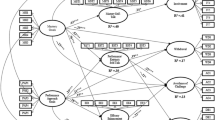Abstract
This qualitative study used a semi-structured interview with 50 fifth grade Israeli students to investigate the relations among achievement goals and social identity processes that concern orientation towards social structure and status in the classroom, and preference and willingness to cooperate with peers from different social groups. Mastery-oriented students were found to evaluate cooperation with respect to its contribution to learning, friendship, and class cohesion, and to be willing to cooperate with peers regardless of their social group membership. Performance-approach and performance-avoidance oriented students were found to evaluate cooperation with regard to its implications for social status, and to prefer to cooperate with peers of the in-group and with high status peers. Performance-avoidance oriented students with low social status were found to also adopt a defensive avoidant orientation in the social domain.
Similar content being viewed by others
References
Ames, C. (1984). Competitive, cooperative, and individualistic goal structures: a cognitive-motivational analysis. In R. Ames & C. Ames (Eds.), Research on motivation in education: student motivation (Vol. 1). New York: Academic Press; pp. 177–207.
Ames, C. (1992a). Achievement goals and the classroom motivational climate. In D. Schunk & J. Meece (Eds.), Student perceptions in the classroom. Hillsdale, NJ: Erlbaum; pp. 327–348.
Ames, C. (1992b). Classrooms: goals, structures, and student motivation. Journal of Educational Psychology, 84, 261–271.
Anderman, L.H. (1999). Expanding the discussion of social perceptions and academic outcomes: mechanisms and contextual influences. In T.C. Urdan (Ed.), Advances in motivation: the role of context (Vol. 11). JAI Press, pp. 303–336.
Anderman, L.H. & Anderman, E.M. (1999). Social predictors of changes in students' achievement goal orientations. Contemporary Educational Psychology, 25, 21–37.
Anderman, E.M. & Maehr, M.L. (1994). Motivation and schooling in the middle grades. Review of Educational Research, 64, 287–309.
Atkinson, J.W. (1957). Motivational determinants of risk-taking behavior. Psychological Review, 64, 359–372.
Blumenfeld, P.C. (1992). Classroom learning and motivation: clarifying and expanding goal theory. Journal of Educational Psychology, 84, 272–281.
Bouffard, T., Vezeau, C., & Bordeleau, L. (1998). A developmental study of the relation between combined learning and performance goals and students' self-regulated learning. British Journal of Educational Psychology, 68, 309–319.
Brewer, M.B. & Brown, R.J. (1998). Intergroup relations. In D.T. Gilbert, S.T. Fiske & G. Lindzey (Eds.), The handbook of social psychology (4th edn, Vol. 2). Boston, MA: McGraw-Hill; pp. 554–594.
Brewer, M.B. & Miller, N. (1988). Contact and cooperation: when do they work? In P. Katz & D. Taylor (Eds.), Eliminating racism: profiles in controversy. New York: Plenum Press; pp. 315–326.
Brown, B.B. (1989). The role of peer groups in adolescents' adjustment to secondary school. In T. Berndt & A. Ladd (Eds.), Peer relationships in child development. New York: John Wiley & Sons; pp. 554–594.
Brown, B.B. (1990). Peer groups and peer cultures. In S.S. Feldman & G.R. Elliott (Eds.), At the threshold: the developing adolescent. Cambridge, MA: Harvard University Press; pp. 171–196.
Butler, R. (1999). Information-seeking and achievement motivation in middle childhood and adolescence: the role of conceptions of ability. Developmental Psychology, 35, 146–163.
Cairns, R.B., Perrin, J.E. & Cairns, B.D. (1985). Social structure and social cognition in early adolescence: affiliative patterns. Journal of Early Adolescence, 5, 339–355.
Church, M.A., Elliot, A.J. & Gable, S.L. (2001). Perceptions of classroom environment, achievement goals, and achievement outcomes. Journal of Educational Psychology, 93, 43–54.
Cohen, E.G. & Lotan, R.A. (1997). Creating equal-status interaction in heterogeneous classrooms: evidence from complex instruction. In R. Ben-Ari & Y. Rich (Eds.), Enhancing education in heterogeneous schools: theory and application. Ramat-Gan, Israel: Bar-Ilan University Press; pp. 249–280.
Collins, A., Brown, J.S., & Newman, S.E. (1989). Cognitive apprenticeship: teaching the crafts of reading, writing, and mathematics. In L.B. Resnick (Ed.), Knowing, learning, and instruction: essays in honor of Robert Glaser. Hillsdale, NJ: Erlbaum; pp. 453–494.
Covington, M.V. (1992). Making the grade: a self-worth perspective on motivation and school reform. New York: Cambridge University Press.
Devine, P.G. (1995). Prejudice and out-group perception. In A. Tesser (Ed.), Advanced social psychology. New York: McGraw-Hill; pp. 467–524.
Dweck, C.S. (1986). Motivational processes affecting learning. American Psychologist, 41, 1040–1048.
Dweck, C.S. (1996). Social motivation: goals and social-cognitive processes. A comment. In J. Juvonen & K.R.Wentzel (Eds.), Social motivation: understanding children's school adjustment. Cambridge, UK: Cambridge University Press, pp. 181–195.
Dweck, C.S. (1999). Self-theories: their role in motivation, personality, and development. Philadelphia, PA: Psychology Press.
Dweck, C.S. & Leggett, E.L. (1988). A social-cognitive approach to motivation and personality. Psychological Review, 95, 256–273.
Elkind, D. (1967). Egocentrism in adolescence. Child Development, 38, 1025–1034.
Elliot, A.J. (1997). Integrating the 'classic' and 'contemporary' approaches to achievement motivation: a hierarchical model of approach and avoidance achievement motivation. In M.L. Maehr & P.R. Pintrich (Eds.), Advances in motivation and achievement (Vol. 10). Greenwich, CT: JAI Press Inc; pp. 143–179.
Elliot, A.J. (1999). Approach and avoidance motivation and achievement goals. Educational Psychologist, 34, 169–189.
Elliot, A.J. & Church, M.A. (1997). A hierarchical model of approach and avoidance achievement motivation. Journal of Personality and Social Psychology, 72, 218–232.
Elliot, A.J. & Harackiewicz, J.M. (1996). Approach and avoidance achievement goals and intrinsic motivation: a mediational analysis. Journal of Personality and Social Psychololy, 70, 461–475.
Fein, S. & Spencer, S.J. (1997). Prejudice as self-image maintenance: affirming the self through derogating others. Journal of Personality and Social Psychology, 73, 31–44.
Harackiewicz, J.M., Barron, K.E., Pintrich, P.R., Elliot, A.J., & Thrash, T.M. (2002). Revision of achievement goal theory: necessary and illuminating. Journal of Educational Psychology, 94, 638–645.
Hertz-Lazarowitz, R. & Miller, N. (Eds.). (1992). Interaction in cooperative groups: the theoretical anatomy of group learning. New York: Cambridge University Press.
Hicks, L.H. (1997). How do academic motivation and peer relationships mix in an adolescent's world? Middle School Journal, 28, 18–22.
Johnson, D.W. & Johnson, R.T. (1987). Learning together and alone (2nd edn.). Englewood Cliffs, NJ: Prentice-Hall.
Juvonen, J. & Wentzel, K.R. (Eds.). (1996). Social motivation: understanding children's school adjustment. New York: Cambridge University Press.
Kaplan, A. (in press). Achievement goals and intergroup relations. In M.L. Maehr & P.R. Pintrich (Eds.), Advances in research on motivation and achievement: Vol. 13: Motivating students, improving schools: the legacy of Carol Midgley. JAI Press.
Kaplan, A. & Maehr, M. (2002). Adolescents' achievement goals: situating motivation in sociocultural contexts. In F. Pajaers & T. Urdan (Eds.), Adolescence and education: Vol. 2, academic motivation of adolescents. Greenwich, CT: Information Age; pp. 125–167.
Kaplan, A., Menda-Ben-Yakov, I., & Segal, A. (1999). Achievement goals and willingness to cooperate with peers: are performance-approach goals adaptive? Are task goals enough? Poster presented at the annual meeting of the American Educational Research Association, Montreal, Canada.
Kaplan, A., Middleton, M.J., Urdan, T., & Midgley, C. (2002). Achievement goals and goal structures. In C. Midgley (Ed.), Goals, goal structures, and patterns of adaptive learning. Mahwah, NJ: Erlbaum; pp. 21–53.
Keating, D.P. (1990). Adolescent thinking. In S.S. Feldman & G.R. Elliot (Eds.), At the threshold: the developing adolescent. Cambridge, MA: Harvard University Press; pp. 54–89.
Kindermann, T.A. (1993). Natural peer groups as contexts for individual development: the case of children's motivation in school. Developmental Psychology, 29, 970–977.
Maehr, M.L. (1984). Meaning and motivation: toward a theory of personal investment. In R. Ames & C. Ames (Eds.), Research on motivation in education: student motivation. (Vol. 1). New York: Academic Press; pp. 115–143.
Meece, J.L. & Holt, K. (1993). A pattern analysis of students' achievement goals. Journal of Educational Psychology, 85, 582–590.
Middleton, M.J. & Midgley, C. (1997). Avoiding the demonstration of lack of ability: an underexplored aspect of goal theory. Journal of Educational Psychology, 89, 710–718.
Midgley, C., Kaplan, A., Middleton, M., Maehr, M.L., Urdan, T., Anderman, L.H., Anderman, E., & Roeser, R. (1998). The development and validation of scales assessing students' achievement goal orientations. Contemporary Educational Psychology, 23, 113–131.
Midgley, C., Kaplan, A., & Middleton, M. (2001). Performance-approach goals: good for what, for whom, under what circumstances, and at what cost? Journal of Educational Psychology, 93, 77–86.
Miles, M.B. & Huberman, A.M. (1994). Qualitative data analysis (2nd edn.). Thousand Oaks, CA: Sage.
Mullen, B., Brown, R., & Smith, C. (1992). Ingroup bias as a function of salience, relevance, and status: an interaction. European Journal of Social Psychology, 22, 103–122.
Newman, P.R. (1982). The peer group. In B.B. Wolman (Ed.), Handbook of developmental psychology. Englewood Cliffs, NJ: Prentice-Hall; pp. 526–535.
Nicholls, J.G. (1984). Achievement motivation: conceptions of ability, subjective experience, task choice, and performance. Psychological Review, 91, 328–346.
O'Donnell, A.M. & King, A. (Eds.), (1999). Cognitive perspectives on peer learning. Mahwah, NJ: Erlbaum.
Patrick, H., Anderman, L.H., & Ryan, A.M. (2002). Social motivation and the classroom social environment. In C. Midgley (Ed.), Goals, goal structures, and patterns of adaptive learning. Mahwah, NJ: Erlbaum; pp. 85–108.
Pintrich, P.R. (1994). Continuities and discontinuities: future directions for research in educational psychology. Educational Psychologist, 29, 137–148.
Pintrich, P.R. (2000a). Multiple goals, multiple pathways: the role of goal orientation in learning and achievement. Journal of Educational Psychology, 92, 544–555.
Pintrich, P.R. (2000b). The role of goal orientation in self-regulated learning. In M. Boekaerts, P. Pintrich & M. Zeidner (Eds.), Handbook of self-regulation: theory, research and applications. San Diego, CA: Academic Press; pp. 451–502.
Ryan, A.M., Hicks, L.H., & Midgley, C. (1997). Social goals, academic goals, and avoiding seeking help in the classroom. Journal of Early Adolescence, 17, 152–171.
Sachdev, I. & Bourhis, R. (1987). Status differentials and intergroup behaviour. European Journal of Social Psychology, 17, 277–293.
Schlenker, B.R. (1987). Threats to identity: self-identification and social stress. In C.R. Snyder & C.E. Ford (Eds.), Coping with negative life events: clinical and social psychological perspectives. New York: Plenum Press; pp. 273–321.
Skaalvik, E.M. (1997). Self-enhancing and self-defeating ego orientation: relations with task and avoidance orientation, achievement, self-perceptions, and anxiety. Journal of Educational Psychology, 89, 1–11.
Slavin, R.E. (1990). Cooperative learning: theory, research and practice. Englewood, NJ: Prentice-Hall.
Slavin, R.E. (1997). Cooperative learning and student diversity. In R. Ben-Ari & Y. Rich (Eds.), Enhancing education in heterogeneous schools: theory and application. Ramat-Gan, Israel: Bar-Ilan University; pp. 215–247.
Steele, C.M. (1988). The psychology of self-affirmation: sustaining the integrity of the self. In L. Berkowitz (Ed.), Advances in experimental social psychology (Vol. 21). New York: Academic Press; pp. 261–302.
Tajfel, H. & Turner, J.C. (1986). The social identity theory of intergroup behavior. In S. Worchel & W. Austin (Eds.), Psychology of intergroup relations. Chicago: Nelson-Hall; pp. 7–24.
Urdan, T. (1997a). Achievement goal theory: past results, future directions. In M.L. Maehr & P.R. Pintrich (Eds.), Advances in motivation and achievement (Vol. 10). Greenwich, CT: JAI Press; pp. 99–141.
Urdan, T. (1997b). Examining the relations among early adolescent students' goals and friends' orientation toward effort and achievement in school. Contemporary Educational Psychology, 22, 165–191.
Urdan, T.C. & Maehr, M.L. (1995). Beyond a two-goal theory of motivation and achievement: a case for social goals. Review of Educational Research, 65, 213–243.
Urdan, T., Ryan, A.M., Anderman, E.M., & Gheen, M.H. (2002). Goals, goal structures, and avoidance behaviors. In C. Midgley (Ed.), Goals, goal structures, and patterns of adaptive learning. Mahwah, NJ: Erlbaum; pp. 55–83.
Vivian, J., Hewstone, M., & Brown, R. (1997). Intergroup contact: theoretical and empirical developments. In R. Ben-Ari & Y. Rich (Eds.), Enhancing education in heterogeneous schools: theory and application. Ramat-Gan, Israel: Bar-Ilan University Press; pp. 13–46.
Webb, N.M. & Palincsar, A.S. (1996). Group processes in the classroom. In D.C. Berliner & R.C. Calfee (Eds.), Handbook of educational psychology. New York: Simon & Schuster; pp. 841–873.
Author information
Authors and Affiliations
Corresponding author
Rights and permissions
About this article
Cite this article
Levy, I., Kaplan, A. & Patrick, H. Early Adolescents' Achievement Goals, Social Status, and Attitudes Towards Cooperation with Peers. Social Psychology of Education 7, 127–159 (2004). https://doi.org/10.1023/B:SPOE.0000018547.08294.b6
Issue Date:
DOI: https://doi.org/10.1023/B:SPOE.0000018547.08294.b6




